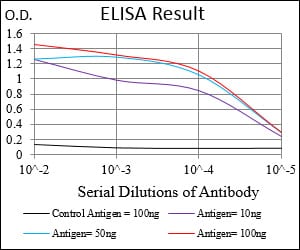
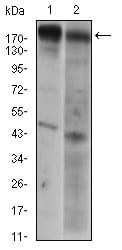
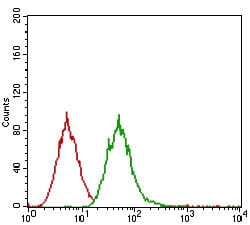
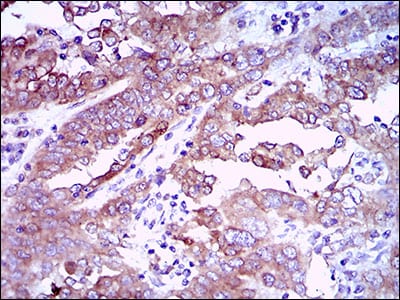
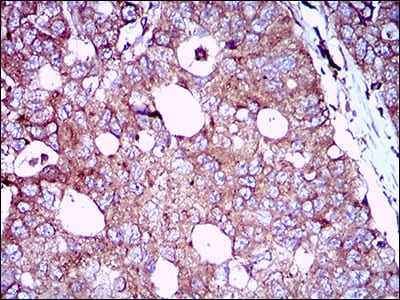
| WB | 1/500 - 1/2000 | Human,Mouse,Rat |
| IF | 咨询技术 | Human,Mouse,Rat |
| IHC | 1/200 - 1/1000 | Human,Mouse,Rat |
| ICC | 技术咨询 | Human,Mouse,Rat |
| FCM | 1/200 - 1/400 | Human,Mouse,Rat |
| Elisa | 1/10000 | Human,Mouse,Rat |
| Aliases | ERBB; HER1; mENA; ERBB1; PIG61 |
| Entrez GeneID | 1956 |
| clone | 7A6F12 |
| WB Predicted band size | 175kDa |
| Host/Isotype | Mouse IgG1 |
| Antibody Type | Primary antibody |
| Storage | Store at 4°C short term. Aliquot and store at -20°C long term. Avoid freeze/thaw cycles. |
| Species Reactivity | Human |
| Immunogen | Purified recombinant fragment of human EGFR (AA: 693-893) expressed in E. Coli. |
| Formulation | Purified antibody in PBS with 0.05% sodium azide |
+ +
以下是3-4篇关于EGFR抗体的代表性文献(简略版):
1. **文献名称**:Cetuximab for the treatment of colorectal cancer
**作者**:Cunningham D, et al.
**摘要**:报道西妥昔单抗(抗EGFR单抗)联合化疗在转移性结直肠癌中的III期临床试验结果,显示显著延长无进展生存期(2004年,NEJM)。
2. **文献名称**:Activation of MET by EGFR resistance mechanisms
**作者**:Yonesaka K, et al.
**摘要**:揭示EGFR抗体(如西妥昔单抗)治疗后出现耐药的机制,发现MET信号通路激活是导致耐药的关键因素(2011年,Sci Transl Med)。
3. **文献名称**:Panitumumab versus cetuximab in patients with wild-type KRAS colorectal cancer
**作者**:Price TJ, et al.
**摘要**:比较帕尼单抗(全人源抗EGFR单抗)与西妥昔单抗在KRAS野生型结直肠癌中的疗效,显示两者总体生存率相似(2014年,JCO)。
4. **文献名称**:EGFR antibodies in head and neck cancer
**作者**:Bonner JA, et al.
**摘要**:证实西妥昔单抗联合放疗可显著提高局部晚期头颈部鳞癌患者的总生存期(2006年,NEJM)。
如需具体引用格式或更多文献,可进一步补充信息。
×